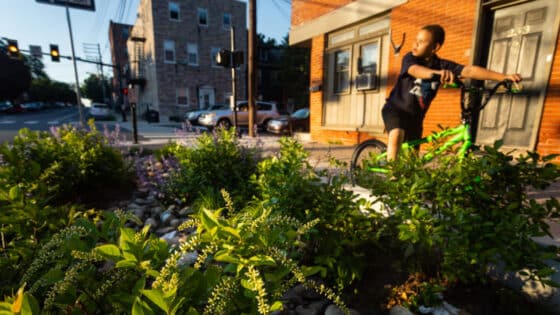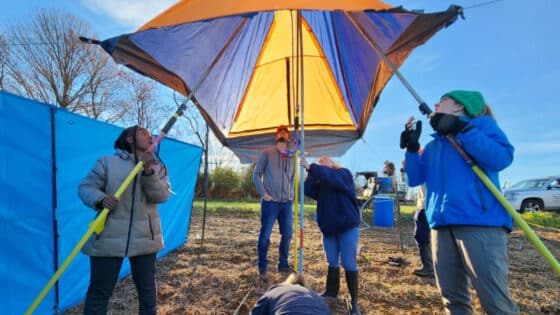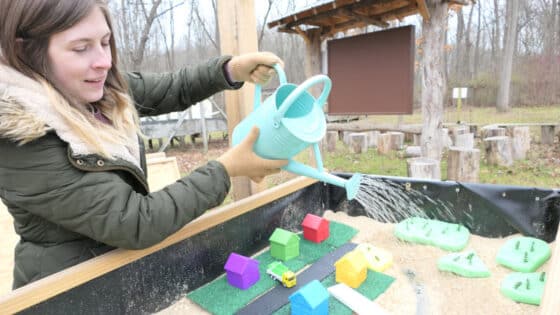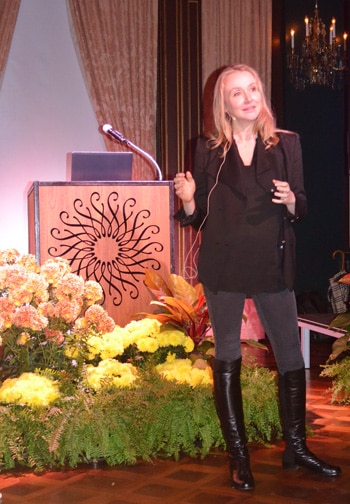
Stroud Water Research Center conferred the Stroud Award for Freshwater Excellence to Alexandra Cousteau during its annual Water’s Edge gala presented by Wilmington Trust at Longwood Gardens.
A Famous Grandfather Helped Her Discover a Lifelong Passion for Water
During her acceptance speech, Alexandra Cousteau shared a childhood memory she described as “one of those turning points in my life.” During a visit to the Mediterranean Sea, her famous grandfather, Jacques, outfitted the seven-year-old with an old-fashioned rubber face mask, secured a small compressed air tank to her back and placed a regulator, which covered most of her face, in her mouth.
“When I shuffled to the edge of the boat in my little, red, rubber fins and peered down into the dark water, I thought to myself, ‘I’m going to die.’”
She didn’t. Instead she discovered a passion that defined the rest of her life.
“When I looked up, I saw the sunlight shimmering through the water. Then I saw a school of fish swimming towards me. They enveloped me for a moment, and when I put my hand out, they would move away in unison, and I thought, ‘This is so cool.’ I had a sense of awe and wonder.”
Sharing Her Family’s Legacy With the World
Now, Cousteau continues her family’s legacy by sharing that sense of awe and wonder with the rest of the world.
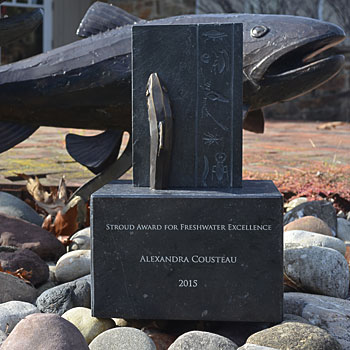
Through Blue Legacy, a nonprofit organization she founded in 2009, Cousteau tells immersive, personal stories that explore the interconnectivity of fresh water and ocean issues around the globe. Her goal is to inspire and empower people to reclaim and restore water resources.
In 2009, she traveled across five continents for 100 days, with a team of filmmakers and journalists. The next year she led an 18,000-mile expedition around North America creating short films, raising money and talking to the news media.
That’s why Cousteau was selected to receive the Stroud Award for Freshwater Excellence, said Director Bernard W. Sweeney, Ph.D., when he introduced her during the nonprofit’s annual Water’s Edge gala on November 19.
Each year, since 2011, Stroud Center has conferred the award on someone who has made an outstanding contribution that protects freshwater resources; improves the quantity and quality of fresh water globally; or helps secure clean, fresh water for future generations.
“Alexandra’s done it all,” declared Sweeney.
“Everything I’ve Seen at the Stroud Center is What I’ve Been Dreaming, Thinking, and Writing About.”
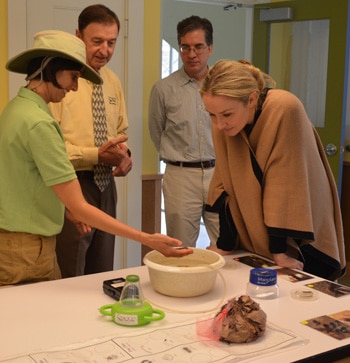
Cousteau said receiving the award was nice, but she was most excited about touring Stroud Center’s research and education complex and meeting its scientists.
“Scientists accompanied us during all of our expeditions,” she said. “Everything I’ve seen at Stroud Center is what I’ve been dreaming, thinking and writing about.”
During a facilities tour earlier that day, Cousteau was introduced to Stroud Center’s citizen science water-monitoring tools, such as Monitor My Watershed®, part of the WikiWatershed® online suite that will allow people across the country to explore what is known about their regional watershed.
She also learned about EnviroDIY™, an online community hosted by Stroud Center, where people can collaborate to create affordable, open-source data loggers and sensors that enable them to monitor water quality locally.
Cousteau was also introduced to Stroud Center’s Leaf Pack Experiment Stream Ecology Kit that teaches people how to assess water quality by noting the numbers and types of aquatic insects that colonize leaf packs.
Courageous Ideas Needed to Solve the Freshwater Crisis
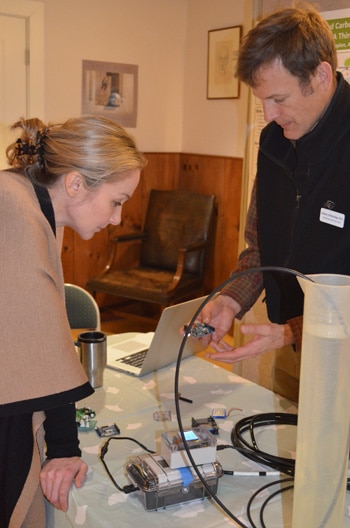
“We can’t depend on the Jacques Cousteaus of the world. We have to take responsibility ourselves. We have to make it easy and provide affordable technology to help people monitor water and report those results. We have to make it exciting and translate science in ways that will inspire people to be a part of the solution. And the work that Stroud Center is doing is an answer to that challenge,” Cousteau said.
“When we ask, do we have enough water when we need it and where we need it, and is the water quality good enough for our children to swim in, drink from and fish in, too often that answer is no, ” she said.
Cousteau added that one of the things she loved about the United States is its appetite for courageous ideas and willingness to think outside the box. For that reason, she believes the United States could provide leadership to the rest of the world in “solving the greatest crisis of our time and that is the quantity and quality of our freshwater resources.”
“This is Just the Beginning of a Long Relationship.”
In closing, Cousteau promised, “This is just the beginning of a long relationship. I already invited myself back.” She said she would visit Stroud Center again in May, with her family.
“My 4-year-old daughter is going to get such a kick out of looking for bugs in your stream.”

